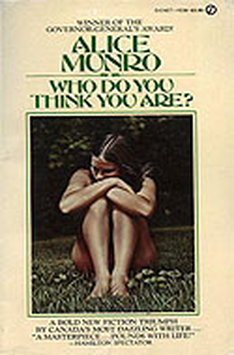Our Nobel Laureate’s Ignoble Canada  Who Do You Think You Are? Who Do You Think You Are? Alice Munro 1978, Macmillan of Canada In the wake of her Nobel prize, many readers are either revisiting the work of Alice Munro, or discovering her for the first time, and, in both cases, there is no better place to start than with her 1978 Governor General’s Award winning Who Do You Think You Are? Like the earlier Lives of Girls and Women, Who Do You Think You Are? is a collection of linked stories occupying the rich and indefinite middle ground between the short story and the novel. The book follows Rose through her development in the small southern Ontario town of Hanratty, her departure for university, an early failed marriage and an itinerant professional life that sees her work as a radio announcer, a sessional college instructor, an interviewer, and a stage and television actor most well known for playing a supporting role on a thinly veiled fictional version of The Beachcombers. Born into poverty on the wrong side of town, Rose is indelibly marked (it would be just as accurate to say, irreparably damaged) by the casual violence, class stratification, and restrictive sexism that is the ugly flip side of the small town idyll, and the stories read as a wide ranging exploration of the legacy of her traumatic upbringing. Munro is regularly dismissed as a mothers’ or grandmothers’ writer, praised for the richness of stories that focus on the domestic, the feminine and the local, and passed over for the same reasons that she is praised. Readers will find all the expected strengths in Who Do You Think You Are?: the stories shuttle fluidly back and forth through time, relying more often on thematic connections than on the resolution of plot to achieve their effects; the characters in individual stories have a depth and complexity rarely found outside of novels; the personal and interior lives of women are drawn with penetrating insight and a deft touch; it makes sense to call her our Chekov. But there is a great deal more to this book than the caricature of Munro as a talented but anodyne domestic realist allows. Who Do You Think You Are? persistently juxtaposes Rose’s disempowerment, the social restrictions placed on her professional, romantic and emotional lives, with the power and entitlement of men who exercise the freedom of their advantages with unselfconscious impunity, often at the expense of women. This imbalance is introduced in Hanratty, but it is not limited to the small town. In British Columbia and Ontario, among the rich and the rural poor, with intellectuals, bohemians and business people, Rose encounters that same pattern, and, as the stories accumulate, they build up to a quiet but damning indictment of a society defined by a pervasive misogyny. Munro may be best known for her interest in the domestic, the feminine, and the local, and Who Do You Think You Are? is all of these things, but it is also political in its concerns, feminist in its orientation and national in its scope. At a time when Canadians are celebrating her, it is a reminder that our Nobel Laureate has been sharply critical of her country, and she is worth reading or re-reading because of it. Aaron Schneider is the reviews editor of The Rusty Toque. He teaches Writing and Canadian Literature courses at Western University.
Comments are closed.
|
RUSTY RECOMMENDS
In the spirit of supporting writing—especially writing that's off the radar or under appreciated—we want to know what you are excited about reading and what you think we should be reading. Your recommendations should be paragraph length (approximately 250 to 300 words) and should briefly summarize the book and detail why you are recommending it or why you think others should read it. Send our reviews editor Aaron Schneider your recommendations of Canadian and International fiction and poetry. Please write "Rusty Recommends" in the subject line. Include your (250 to 300 word) recommendation, name, and a link to your website, blog, or social media site (if you have one). Selected recommendations will be posted on our website. We will contact you if your recommendation is selected for publication. There is no payment for publication of Rusty Recommends. Archives
July 2015
Categories
All
Rusty Recommends Editor:
Dr. Aaron Schneider completed a PhD. in Canadian Literature at Western University where he currently teaches courses in public speaking, political rhetoric and Canadian Literature. He is excited about bringing together his interests in World and Canadian Literature. He is the co-founder and co-editor of The Rusty Toque and Western's online student journal Occasus. |

 RSS Feed
RSS Feed
